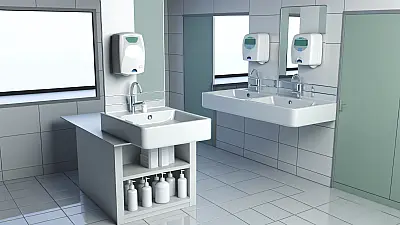EASTPORT, ME - State inspectors found serious gaps in medication handling and infection control protocols at Eastport Memorial Nursing Home during a January 29 inspection, including failures to properly manage insulin storage and implement water safety testing to prevent potentially deadly waterborne infections.

Insulin Management Failures Put Diabetic Residents at Risk
The most concerning violation involved the facility's handling of insulin medications, critical for residents with diabetes. Inspectors discovered that staff were not properly dating insulin vials and pens, failing to discard expired insulin, and lacking adequate monitoring systems to ensure medication safety.
The facility had previously been cited for similar insulin management deficiencies and had submitted a plan of correction on February 14, 2025, promising staff education and weekly monitoring for six months. However, when inspectors returned on March 18, they found the promised improvements had not been implemented.
During interviews with the Administrator and Director of Nursing, facility officials could not provide evidence that staff had received the promised education on proper insulin handling or that the committed weekly audits were being conducted. This failure to follow through on corrective measures represents a serious breach of regulatory compliance and patient safety protocols.
Proper insulin management is critical for diabetic residents because expired or improperly stored insulin can lose its effectiveness, leading to dangerous blood sugar fluctuations. When insulin degrades due to improper storage or age, it may not adequately control glucose levels, potentially resulting in diabetic emergencies including ketoacidosis or severe hypoglycemia. Both conditions can be life-threatening, particularly in elderly nursing home residents who may have multiple health conditions.
Water Safety Program Lacks Essential Testing Protocols
Inspectors also identified significant deficiencies in the facility's water management program designed to prevent Legionella and other waterborne pathogens. The facility's Water Management Program, last updated in May 2022, was found to lack essential testing protocols and monitoring procedures.
The inspection revealed no evidence of established testing procedures for water quality, no defined acceptable ranges for test results, and no intervention protocols if water tested positive for dangerous pathogens. The Maintenance Supervisor acknowledged to inspectors that he could not provide evidence of any plan or protocol for Legionella testing or monitoring.
Legionella bacteria can cause Legionnaires' disease, a severe form of pneumonia that is particularly dangerous for elderly individuals and those with compromised immune systems. Nursing home residents are at especially high risk due to their age and often weakened health status. The bacteria thrives in warm water systems and can spread through building water supplies, cooling towers, and plumbing systems.
Effective water management programs require regular testing, established safety thresholds, and immediate response protocols when dangerous bacteria levels are detected. Without these safeguards, residents face increased risk of serious respiratory infections that can be fatal in vulnerable populations.
Medical Standards and Industry Best Practices
Federal regulations require nursing homes to maintain comprehensive infection prevention and control programs, including water management systems that prevent the growth and spread of waterborne pathogens. These programs must include regular monitoring, testing protocols, and corrective action procedures.
For medication management, facilities must ensure all drugs are properly labeled with expiration dates and that expired medications are promptly discarded. Insulin requires particular attention because its potency decreases over time and with improper storage. Standard protocols require dating all insulin products when first used and discarding them according to manufacturer guidelines, typically 28 days after opening for most formulations.
Water management programs should include routine testing for Legionella and other opportunistic pathogens, particularly in high-risk areas like hot water systems, cooling towers, and decorative water features. The Centers for Disease Control and Prevention recommends that healthcare facilities maintain water temperatures above 140°F in hot water systems and below 68°F in cold water systems to inhibit bacterial growth.
Regulatory Response and Ongoing Oversight
The facility received citations under federal regulation F761 for medication management deficiencies and F0880 for infection prevention and control failures. Both violations were classified as having minimal harm or potential for actual harm, affecting few residents.
The inspection findings highlight the importance of sustained compliance with safety protocols rather than temporary fixes. The facility's failure to implement its own corrected action plan demonstrates the need for consistent oversight and accountability in nursing home operations.
Additional Issues Identified
The inspection also documented other areas of concern related to the facility's overall compliance with federal healthcare standards, though specific details of additional violations were not provided in the available inspection narrative.
These deficiencies underscore the critical importance of robust quality assurance programs in nursing homes, where residents depend entirely on staff for medication management and environmental safety. Regular internal auditing, staff training, and management oversight are essential components of maintaining safe care environments for vulnerable elderly residents.
The violations at Eastport Memorial Nursing Home reflect broader challenges in long-term care facility management, where complex medical needs and regulatory requirements demand constant vigilance and systematic approaches to resident safety and care quality.
Full Inspection Report
The details above represent a summary of key findings. View the complete inspection report for Eastport Memorial Nursing Home from 2025-01-29 including all violations, facility responses, and corrective action plans.
💬 Join the Discussion
Comments are moderated. Please keep discussions respectful and relevant to nursing home care quality.